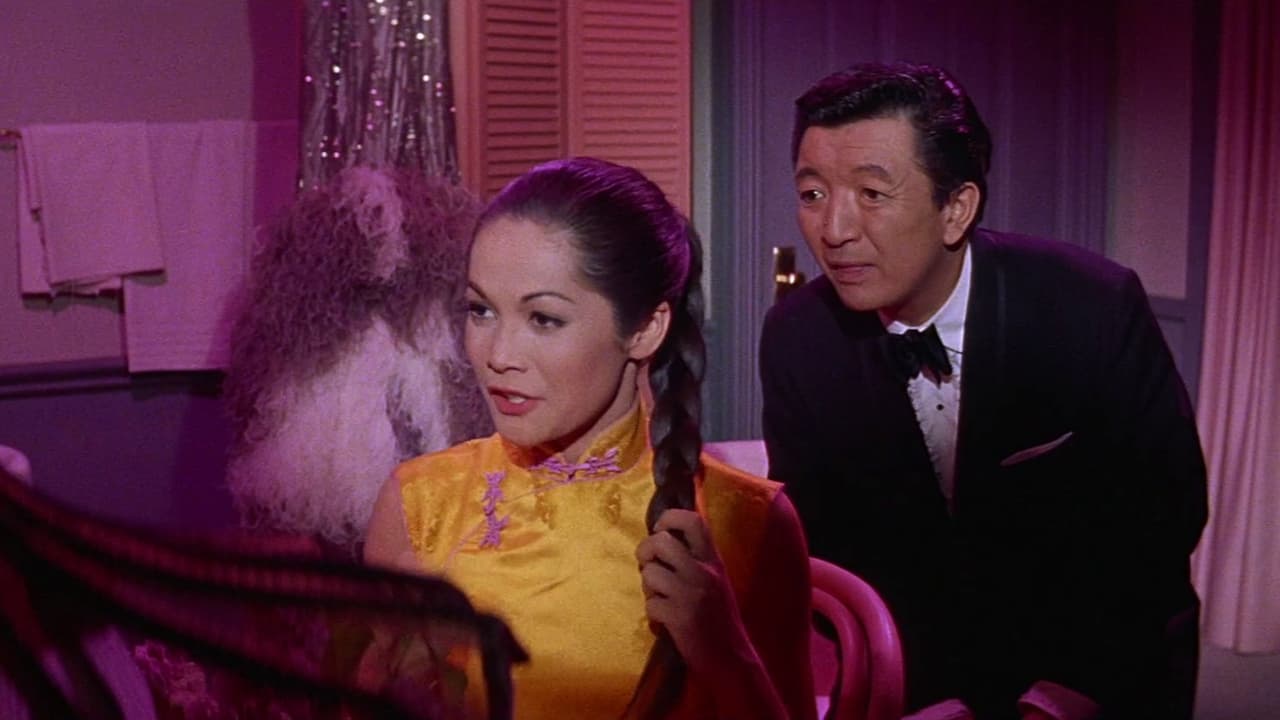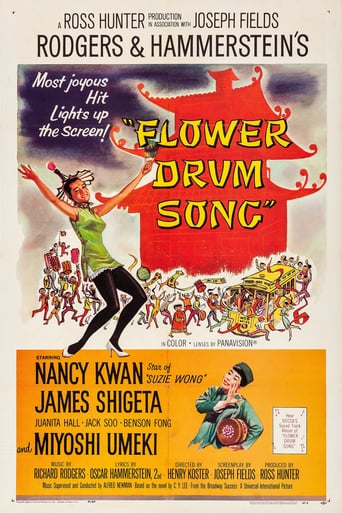

The greatest movie ever made..!
... View MoreNot even bad in a good way
... View MoreAs somebody who had not heard any of this before, it became a curious phenomenon to sit and watch a film and slowly have the realities begin to click into place.
... View MoreA clunky actioner with a handful of cool moments.
... View MoreMid 1990s my girlfriend and I were three blocks away from Kearny in the downtown section of San Francisco, and it took us an hour to go one block because of Christmas traffic.I tell that story because because Kearny, which goes right through Chinatown, although it flows well, gets more crowded every year, and this film, even though it was shot on stage, does give a bit of a glimpse into early 1960s San Francisco, before the civil rights movement and before the more recent tech-revolution from the 90s up to this very day. The city was less crowded, a bit more friendlier, and certainly more affordable. The schism portrayed in this film between immigrant Chinese and those who had been here a few generations since before the gold rush, still exists somewhat, but isn't quite as pronounced as depicted here. Then again "Flower Drum Song" is a musical, and not exactly an anthropological study of immigrant race trying to meld with their new host nation.The musical numbers are enjoyable, the acting is a bit more pronounced than today's less melodrama driven so-called "method" acting, which is a bit welcome. A man gets tired of alleged "realistic" performances from talent hoping to be remembered for great performances. "Flower Drum Song", like a lot of movies coming out of Hollywood, is meant to show the positive light of Chinese Americans in a time when the world was not interconnected as it is today, and in this way is meant to hopefully enlighten non-Chinese the nation over (and beyond). The more relaxed mind will be tend to be open to the message, but my main criticism with a lot of these films is that you'll not crack the hardened bigot no matter how good a show you put on. Even so, it's a very enjoyable film, though I can guarantee you that Grant Avenue is usually packed and has an odd mix of smells of imported and freshly caught food for restaurants and stores alike. The characters are stock, borderline stereotypes at times, but otherwise much in the tradition of the film portraying the traditional old guard elders emotionally clashing with their offspring who bring who new ideas and American pop culture to the home. A collision occurs.Do young hearts know what they want? Does father know best? Are traditions the best way to go, or is the American way the best way? It's a musical from the late 50s early 60s and the proposition is portrayed in that spirit.If I had one critique it's that the DVD gets a little grainy for the few SFX shots, notably for Nancy Kwan's mirror sequence. That, and like nearly all musicals of the time, the thing is shot entirely on stage, which has always been a sore point with me.Otherwise it's a very beautiful film, and you should see it at least once. If you like the theatre, enjoy a good musical, then this will probably prove delightful.Give it a whirl.
... View MoreHow dated. Sexist. Racist. Stereotypical. Sometimes disgusting in the depiction of Asians coming to America.Adjusting to life in America. Reminds one of the stereotypical Puerto Ricans in West Side Story. America annoying in some ways, they said, but it beats bad conditions in the old country.Jack Soo refreshing to see. Deadpan. Future player on Barney Miller.Women put on makeup. We are no longer 'girls'. We still dress up for "dates", or dress down, for that matter. We don't always enjoy looking forward to living in the home of a free male. Ugh.Too many old movies had Caucasians playing other ethnic types, whether they be portraying Native Americans, African Americans, Asians, et al. This movie mostly had Asian actors, which is somewhat a plus.5/10
... View MoreAnd make sure you head down to Grant Avenue, 'cause the girl who brings your food is another tasty dish! Some critics called this (one of the few musicals to focus on Asians) "A World of Woozy Song", but if there is anything woozy about it, I certainly didn't feel it. In fact, I think this (after "Carousel") is perhaps one of Rodgers and Hammerstein's loveliest scores, and certainly as profound as "South Pacific" and "The King and I". But with a song like "Love Look Away", you have one of the most heart-wrenching ballads in a Broadway show, sung tenderly by a rather minor character you truly feel empathy for. "A Hundred Million Miracles" is certainly filled with indefinite promise, and "Chop Suey" gives us a taste of what Americans have taken from the Chinese culture and transformed into their own flavor. Long before "Kids" from "Bye Bye Birdie", there was "The Other Generation", sung first by the adults who certainly don't understand the teens then later by the teens who have become Americanized and don't understand the adults, new Americans from another country. "I Enjoy Being a Girl" would also be re-formatted for "Birdie" as "How Lovely to Be a Woman". Unlike the rock and roll world of "Birdie", this is a definite salute to the changing traditions of Asian Americans (or any offspring of immigrants from any culture), it combines modern dance trends and the cultural influence on the young from their more traditional seniors. Like the Puerto Ricans of "West Side Story", all these youngsters want is a chance, and that is a theme that any culture can identify with.A decade ago, someone came along and turned "Flower Drum Song" into a shell of itself with a "revisal" story for Broadway that was part "Cinderella" and more woozy than Goldilocks after eating the porridge. Claiming that some of the original portrayals of Asian Americans were "offensive", they took out the family element of the original source, which defeated the whole purpose of the generational conflict. Even by giving its heroine a "Miss Saigon" type drama with her escape from Communist China, the remainder of that revival cheated itself in spite of an interesting prologue that ended up being more "stereotypical" by totally changing the structure of the established characters.Miyoshi Umeki plays the young "wetback" (as she refers herself to be in an amusing manner) is an innocent young girl amazed by the differences she finds, and loves her new home. Then, there's sassy Linda (a fun Nancy Kwan-the Chinese Rita Moreno) who knows she's adorable and enjoys it tremendously. The difference between shyness and sassiness makes their acquaintance really sweet as well as those of the men they love.Then, there's the older generation, lead by Benson Fong and Juanita Hall, repeating her Broadway role, and unlike the movie version of "South Pacific", getting to sing as she had on stage. The light-skinned African American Hall is the heart and soul here, as she was in "South Pacific". I've heard some critics called this generation a dated view of the Asian culture but anybody of a certain age can certainly identify with how the different generations relate. Patrick Adiarte as the baseball playing teen, adds a nice charm to his teen-aged character, having already gone down Rodgers and Hammerstein territory with his performance as the prince in "The King and I" on screen. (Years later, he would enter TV immortality as the Hawaiian acquaintance of Greg on "The Brady Bunch".) Reiko Sato, who sings the haunting "Love Look Away", is only on screen for a few minutes, but will steal your heart. Jack Soo ("Hawaii Five-O", "Thoroughly Modern Millie") adds some humor to his performance of the rascal who begs the sweet Umeki "Don't Marry Me". The lavish production really helps make this a fun movie experience, which unfortunately the Rodgers and Hammerstein organization have sold short thanks to pressures from outside groups.
... View MoreThis has got to be the worst of the lot when it comes to Rodgers and Hammerstein stage musicals that made it to the screen.First of all, none of the songs have the memorable qualities one would expect from an R&H musical and certainly none compare favorably to the melodies from SOUTH PACIFIC, OKLAHOMA, CAROUSEL or THE KING AND I.Secondly, MIYOSHI YUMEKI, while a living doll, is naive and funny when she's called upon to be the innocent, but mawkish and unbearable whenever she has to draw sentimental tears. And NANCY KWAN seems phony and totally unreal, even when singing "I Enjoy Being A Girl" which is about the snappiest number in the whole musical.Thirdly, all of the characters are terrible stereotypes exploited for what little humor there is in this story of an immigrant girl looking for a good match as a husband. Neither the slight story nor the characters, all very one-dimensional and predictable, are worth caring about.For me, someone who loves a good musical, this belongs on the bottom tier of the musical genre.
... View More